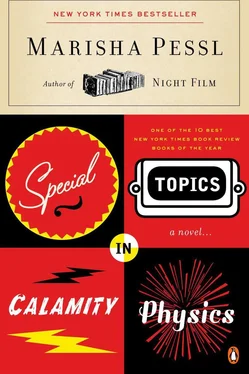“Get a hold of yourself,” he said. “Stop being so melodramatic. This isn’t a miniseries on AB—”
I hurled The Heart of the Matter (Greene, 1948) at his stomach, Common Sense (Paine, 1776) at his face.
“Is this necessary?”
I threw Four Texts on Socrates (West, 1998). I picked up Paradise Lost (Milton, 1667).
“That’s a rare edition,” Dad said.
“Let it be the blow to kill you then!”
Dad sighed and shielded his face. He caught the book in his hands and closed it, placing it neatly on the side table. Immediately, I hurled Rip Van Winkle & the Legend of Sleepy Hollow (Irving, 1819), hitting him in the side.
“If you would collect yourself and behave as a rational person, I might be inclined to tell you how I came to know the supremely unhinged Miss Schneider.”
Discourse on Inequality (Rousseau, 1754) struck his left shoulder.
“Blue, really. If you would simply calm down. You’re inflicting more harm on yourself than me. Look at yourself—”
A large-fonted Ulysses (Joyce, 1922), thrown over my head backhandedly after tossing The King James Bible as a decoy, managed to avert his dodge, knocking him on the side of his face, close to his left eye. He touched where the spine of the book hit him and looked at his hand.
“Are you finished bombarding your father with the Western canon?”
“Why did you lie?” My voice was hoarse. “Why do I always find out you lie to me?”
“Sit down. ” He moved toward me but I aimed a battered edition of How the Other Half Lives (Riis, 1890) at his head. “If you could calm down, you might spare yourself the stress of getting so hysterical.” He took the book from me. That soft part just under a person’s eye — I don’t know what it’s called — it was bleeding. A beadlike drop of blood glistened there. “Now calm down—”
“Don’t change the subject,” I said.
He returned to his chair.
“Are you going to be reasonable?”
“You should be reasonable,” I said loudly, though not as loud as before because my throat hurt.
“I understand what you must think right now—”
“Every time I go somewhere I find out something from other people. Things you didn’t tell me.”
Dad nodded. “I understand completely. Who were you with tonight?”
“I don’t reveal my sources.”
He sighed and put his hands in perfect This-is-the-church-this-is-the-steeple architecture. “It’s really quite simple. You introduced us again on the occasion she drove you home. Sometime in October, wasn’t it? You remember?”
I nodded.
“Well, the woman called me shortly thereafter. Said she was worried about you. You and I weren’t on the best of terms, if you recall, so naturally, I was concerned and accepted her invitation to meet for dinner. She chose a rather inappropriately ornate restaurant, Hyacinth something, and over the course of the seven-course meal proceeded to inform me it was a swell idea for you to start seeing a child psychiatrist to work out some issues you had with your deceased mother. Naturally, I was livid. The sheer gall of the woman! But then, when I came home, saw you — saw your hair, the natural color of feldspar — I began to worry if perhaps she was right. Yes, it was an idiotic, insulting assumption on my part, but all the same, I’ve always been nervous, raising you without your mother. You could say it’s been my Achilles’ heel. And so I had dinner with her two more times, in order to discuss the possibility of your seeing someone, at the end of which I realized, not only did you not need help, she needed help. And rather urgently.” Dad sighed. “I know you liked her, but she was not the most stable of people. She called my office a few times after that. I told her you and I had managed to work things out, that we were fine . And she accepted it. Shortly thereafter, we flew to Paris. I hadn’t talked to or heard anything about her since. Until she committed suicide. Tragic, certainly, but I can’t say I was surprised.”
“When did you send her the barbaresco orientals?”
“I — the what? ”
“ Ob viously you didn’t buy them for Janet Finnsbroke who dates back to the Paleozoic Period. You bought them for Hannah Schneider.”
He stared at me. “Yes. I — well, I didn’t want you to—”
“Then you were madly in love with her,” I interrupted. “Don’t lie. Say it—”
Dad laughed. “Hardly.”
“No one buys barbaresco orientals for someone they’re not in love with.”
“Then call Guinness. I am the first, my dear.” He shook his head. “I told you. I thought she was rather sad. I sent her flowers after one of our dinners, after I told her, rather harshly, what I thought of her — that she was one of those despairing people who concoct madcap theories about others — and doubtlessly for herself — purely for entertainment as their own lives are so dull. Such people wish to be bigger than they actually are. And naturally, when one speaks one’s mind — tells someone the truth, or one’s personal version of it — it never goes over well. Someone always ends up crying. Remember what I’ve always said about truth, standing in a long black dress in the corner, feet together, head down?”
“She’s the loneliest girl in the room.”
“Precisely. Contrary to popular belief, no one wants anything to do with her. She’s too depressing to be around. Trust me, everyone prefers to dance with something a little sexier, a little more comforting. And so I sent flowers. I didn’t know what kind they were. I asked the florist to pick something—”
“They were barbaresco oriental lilies.”
Dad smiled. “Well, now I know.”
I didn’t say anything. The position at which Dad was sitting, turned away from the lamplight, made his face old. The wrinkles on his face textured him. Lines cut toward his eyes and along his face, in his hands, tiny tears all over him.
“So it was you calling that night,” I said.
He looked at me. “What?”
“The night I ran away to her house. You called her.”
“Who?”
“Hannah Schneider. I was there when the phone rang. She said it was Jade, but it wasn’t Jade. It was you.”
“Yes,” he said softly, nodding. “Maybe that’s right. I did call her.”
“See? You — you have an entire relationship with her and you—”
“Why do you think I called her?” Dad shouted. “That nut job was my only lead! I didn’t know the names or telephone numbers of any of those other pieces of fuzz you’d befriended. And when she told me you’d just materialized on her doorstep, immediately I wanted to come get you, but again, she proposed one of her squishy psychoanalytic ideas and I, being something of a fool when it comes to my daughter as we’ve well established this evening, I went along with it. ‘Leave her alone. We need to talk. Just us girls.’ Dear God. If there’s one supremely puffed-up concept in all of Western Culture, it’s the talk. Doesn’t anyone remember that cute little phrase, which I happen to find rather illuminating? Talk is cheap?”
“Why didn’t you say something?”
“I suppose I was embarrassed.” Dad gazed at the floor, the landfill of books. “After all, you were completing your application to Harvard. I didn’t wish to upset you.”
“Maybe I wouldn’t have been upset. Maybe I’m more upset now. ”
“Granted, it wasn’t the wisest decision, but it was a decision I thought best at the time. Anyway, this business with Hannah Schneider is finished. May she rest in peace. The school year’s nearly over.” Dad sighed. “It’s one for the books, is it not? I think Stockton is certainly the most theatrical town in which we’ve lived. It has all the elements of a good piece of fiction. More passion than Peyton Place, more frustration than Yoknapatawpha County. And it’s certainly up there with Macondo in terms of sheer elements of the bizarre. It has sex, sin and that most painful quality of all, youthful disillusionment. You’re ready, sweet. You no longer need your old pa.”
Читать дальше












